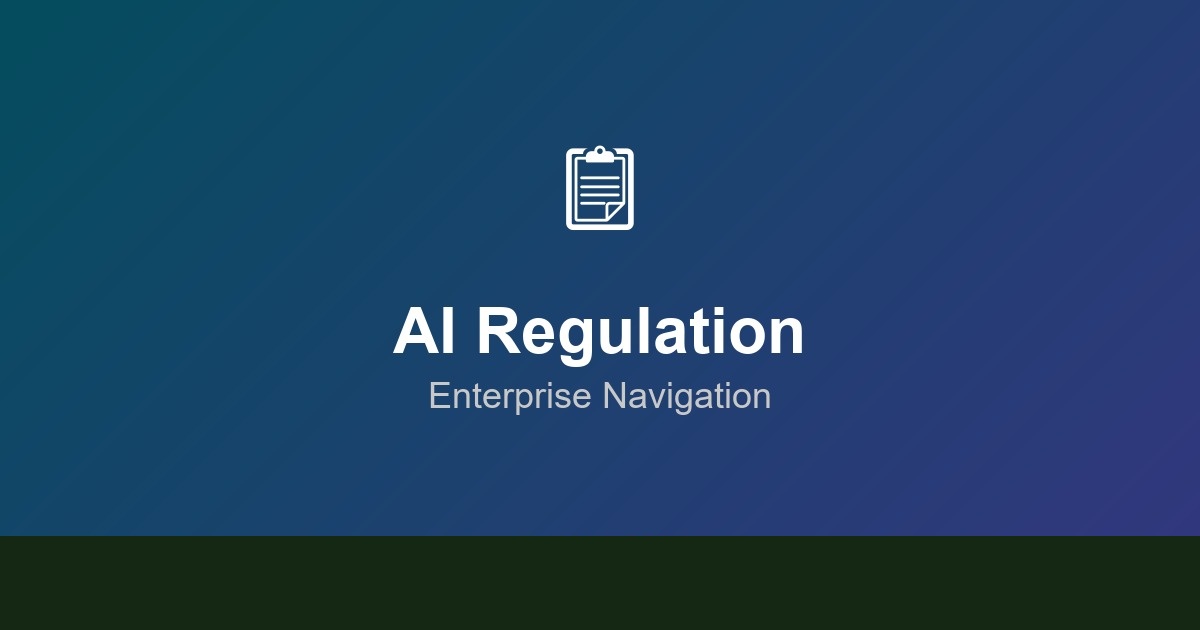Peter Thiel's AI 'Antichrist' Warning: Navigating Regulation for Enterprise ROI

Peter Thiel, the provocative venture capitalist, recently ignited a firestorm with his assertion that excessive AI regulation could be the 'Antichrist.' While his rhetoric is characteristically dramatic, it underscores a critical and increasingly urgent challenge for enterprise leaders: how to navigate the burgeoning landscape of AI governance without stifling innovation or sacrificing tangible business value.
Peter Thiel, the provocative venture capitalist, recently ignited a firestorm with his assertion that excessive AI regulation could be the 'Antichrist.' While his rhetoric is characteristically dramatic, it underscores a critical and increasingly urgent challenge for enterprise leaders: how to navigate the burgeoning landscape of AI governance without stifling innovation or sacrificing tangible business value.
Thiel's concern, as reported by sources like The Washington Post [1] and The Guardian [2], centers on the potential for overreaching, centralized control to hinder technological progress. For enterprise businesses, this isn't merely a philosophical debate; it's a strategic imperative with direct implications for competitive advantage, operational efficiency, and ultimately, the bottom line.
The Enterprise Imperative: Balancing Innovation with Responsible AI
The promise of Artificial Intelligence for enterprises is immense, from automating routine tasks and optimizing supply chains to delivering personalized customer experiences. However, the path to realizing this potential is fraught with complexities. A recent MIT report highlighted that 95% of generative AI pilots at companies are failing [3], often due to a lack of clear strategy, governance, and an understanding of regulatory implications.
This is where Thiel's warning, stripped of its apocalyptic imagery, resonates. While unchecked AI development carries inherent risks—ethical dilemmas, data privacy breaches, and algorithmic bias—poorly conceived or overly restrictive regulation can indeed become an 'Antichrist' to innovation, hindering the very ROI enterprises seek.

From Risk to ROI: The Strategic Advantage of Proactive AI Governance
Rather than viewing regulation as a purely restrictive force, forward-thinking enterprises are recognizing the strategic advantage of proactive AI governance. As Centific notes, effective AI governance lowers the volatility of AI investments, extending the lifespan of models and reducing the cost of corrective interventions [4]. Securiti.ai further emphasizes that the ROI of safe enterprise AI lies in improving efficiency and saving costs by reimagining core business processes [5].
Key considerations for enterprise leaders:- Risk Mitigation & Trust: Robust governance frameworks, encompassing data privacy (e.g., GDPR, CCPA), ethical AI principles, and transparency, build trust with customers and stakeholders. This trust is a critical, albeit often intangible, asset that directly impacts brand reputation and long-term viability.
- Operational Efficiency & Cost Savings: Clear guidelines for AI development and deployment prevent costly rework, legal challenges, and reputational damage. By embedding compliance from the outset, companies can streamline processes and ensure their AI initiatives deliver consistent, measurable value.
- Innovation with Guardrails: Regulation, when thoughtfully implemented, can provide necessary guardrails that encourage responsible innovation. It forces organizations to consider the broader societal impact of their AI systems, leading to more robust, ethical, and ultimately, more successful deployments.
- Competitive Differentiation: Companies that can demonstrate a commitment to ethical and compliant AI development will differentiate themselves in the market, attracting top talent and discerning clients.
The Path Forward: Strategic Engagement, Not Fear
Peter Thiel's 'Antichrist' analogy serves as a stark reminder of the high stakes involved in AI regulation. For enterprise decision-makers, the challenge is not to fear regulation, but to engage with it strategically. This means:
1. Developing Internal AI Governance Policies: Establish clear internal policies for AI development, deployment, and oversight that align with emerging regulatory standards and ethical guidelines. 2. Investing in AI Literacy and Training: Ensure that teams across the organization understand the implications of AI, from technical developers to legal and compliance professionals. 3. Advocating for Sensible Regulation: Participate in industry discussions and policy-making to help shape regulations that foster innovation while protecting against harm. 4. Measuring and Communicating ROI: Continuously track and articulate the tangible business value derived from AI initiatives, demonstrating how responsible AI practices contribute to measurable outcomes.
In conclusion, while the debate around AI regulation will undoubtedly continue, enterprise leaders have a clear mandate: to transform potential regulatory hurdles into strategic advantages. By embracing proactive governance, focusing on measurable ROI, and fostering a culture of responsible AI, businesses can ensure that AI remains a powerful engine for growth, rather than a force to be feared.

References
[1] Inside billionaire Peter Thiel's private lectures. (2025, October 10). The Washington Post. https://www.washingtonpost.com/technology/2025/10/10/peter-thiel-antichrist-lectures-leaked/
[2] Inside tech billionaire Peter Thiel's off-the-record lectures. (2025, October 10). The Guardian. https://www.theguardian.com/us-news/2025/oct/10/peter-thiel-lectures-antichrist
[3] MIT report: 95% of generative AI pilots at companies are failing. (2025, August 18). Fortune. https://fortune.com/2025/08/18/mit-report-95-percent-generative-ai-pilots-at-companies-failing-cfo/
[4] How AI governance turns AI investments into ROI. (2025, October 8). Centific. https://centific.com/blog/how-ai-governance-turns-ai-investments-into-roi
[5] The ROI of Safe Enterprise AI: A Business Leader's Guide. (2025, April 20). Securiti.ai. https://securiti.ai/blog/roi-of-safe-enterprise-ai-business-leader-guide/
Ready to Implement AI in Your Enterprise?
Our team of AI experts can help you navigate the complex landscape of AI infrastructure and implementation. Book a free consultation to discuss your specific needs.
Book Free Consultation